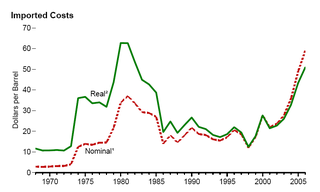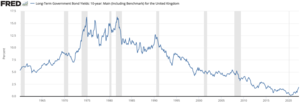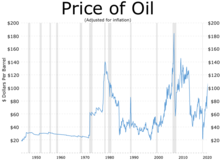In economics, stagflation or recession-inflation is a situation in which the inflation rate is high or increasing, the economic growth rate slows, and unemployment remains steadily high. It presents a dilemma for economic policy, since actions intended to lower inflation may exacerbate unemployment.

Leonard James Callaghan, Baron Callaghan of Cardiff,, commonly known as Jim Callaghan, was a British politician who served as Prime Minister of the United Kingdom from 1976 to 1979 and Leader of the Labour Party from 1976 to 1980. Callaghan is the only person to have held all four Great Offices of State, having served as Chancellor of the Exchequer from 1964 to 1967, Home Secretary from 1967 to 1970 and Foreign Secretary from 1974 to 1976. He was a Member of Parliament (MP) from 1945 to 1987.

The Suez Crisis or the Second Arab–Israeli War, also referred to as the Tripartite Aggression in the Arab world and as the Sinai War in Israel, was a British–French–Israeli invasion of Egypt in 1956. Israel invaded on 29 October, having done so with the primary objective of re-opening the Straits of Tiran and the Gulf of Aqaba as the recent tightening of the eight-year-long Egyptian blockade further prevented Israeli passage. After issuing a joint ultimatum for a ceasefire, the United Kingdom and France joined the Israelis on 5 November, seeking to depose Egyptian president Gamal Abdel Nasser and regain control of the Suez Canal, which Nasser had earlier nationalised by transferring administrative control from the foreign-owned Suez Canal Company to Egypt's new government-owned Suez Canal Authority. Shortly after the invasion began, the three countries came under heavy political pressure from both the United States and the Soviet Union, as well as from the United Nations, eventually prompting their withdrawal from Egypt. Israel's four-month-long occupation of the Egyptian-occupied Gaza Strip and Egypt's Sinai Peninsula enabled it to attain freedom of navigation through the Straits of Tiran, but the Suez Canal itself was closed from October 1956 to March 1957. The Suez Crisis led to international humiliation for the British and the French in the wake of the Cold War, which established the Americans and the Soviets as the world's superpowers. It also strengthened Nasser's standing.

Denis Winston Healey, Baron Healey, was a British Labour Party politician who served as Chancellor of the Exchequer from 1974 to 1979 and as Secretary of State for Defence from 1964 to 1970; he remains the longest-serving Defence Secretary to date. He was a Member of Parliament from 1952 to 1992, and was Deputy Leader of the Labour Party from 1980 to 1983. To the public at large, Healey became well known for his bushy eyebrows, his avuncular manner and his creative turns of phrase.

Black Wednesday, or the 1992 sterling crisis, was a financial crisis that occurred on 16 September 1992 when the UK Government was forced to withdraw sterling from the (first) European Exchange Rate Mechanism , following a failed attempt to keep its exchange rate above the lower limit required for ERM participation. At that time, the United Kingdom held the Presidency of the Council of the European Union.

In October 1973, the Organization of Arab Petroleum Exporting Countries (OAPEC) announced that it was implementing a total oil embargo against the countries who had supported Israel at any point during the Fourth Arab–Israeli War, which began after Egypt and Syria launched a large-scale surprise attack in an ultimately unsuccessful attempt to recover the territories that they had lost to Israel during the Third Arab–Israeli War. In an effort that was led by Faisal of Saudi Arabia, the initial countries that OAPEC targeted were Canada, Japan, the Netherlands, the United Kingdom, and the United States. This list was later expanded to include Portugal, Rhodesia, and South Africa. In March 1974, OAPEC lifted the embargo, but the price of oil had risen by nearly 300%: from US$3 per barrel ($19/m3) to nearly US$12 per barrel ($75/m3) globally. Prices in the United States were significantly higher than the global average. After it was implemented, the embargo caused an oil crisis, or "shock", with many short- and long-term effects on the global economy as well as on global politics. The 1973 embargo later came to be referred to as the "first oil shock" vis-à-vis the "second oil shock" that was the 1979 oil crisis, brought upon by the Iranian Revolution.

Sterling is the currency of the United Kingdom and nine of its associated territories. The pound is the main unit of sterling, and the word "pound" is also used to refer to the British currency generally, often qualified in international contexts as the British pound or the pound sterling.

The Bretton Woods system of monetary management established the rules for commercial relations among the United States, Canada, Western European countries, and Australia among 44 other countries after the 1944 Bretton Woods Agreement. The Bretton Woods system was the first example of a fully negotiated monetary order intended to govern monetary relations among independent states. The Bretton Woods system required countries to guarantee convertibility of their currencies into U.S. dollars to within 1% of fixed parity rates, with the dollar convertible to gold bullion for foreign governments and central banks at US$35 per troy ounce of fine gold. It also envisioned greater cooperation among countries in order to prevent future competitive devaluations, and thus established the International Monetary Fund (IMF) to monitor exchange rates and lend reserve currencies to nations with balance of payments deficits.

Anthony Perrinott Lysberg Barber, Baron Barber, was a British Conservative politician who served as Chancellor of the Exchequer from 1970 to 1974.
In macroeconomics and modern monetary policy, a devaluation is an official lowering of the value of a country's currency within a fixed exchange-rate system, in which a monetary authority formally sets a lower exchange rate of the national currency in relation to a foreign reference currency or currency basket. The opposite of devaluation, a change in the exchange rate making the domestic currency more expensive, is called a revaluation. A monetary authority maintains a fixed value of its currency by being ready to buy or sell foreign currency with the domestic currency at a stated rate; a devaluation is an indication that the monetary authority will buy and sell foreign currency at a lower rate.
The post-war consensus, sometimes called the post-war compromise, was the economic order and social model of which the major political parties in post-war Britain shared a consensus supporting view, from the end of World War II in 1945 to the late-1970s. It ended during the governance of Conservative Party leader Margaret Thatcher. The consensus tolerated or encouraged nationalisation, strong trade unions, heavy regulation, high taxes, and an extensive welfare state.
Chronic inflation is an economic phenomenon occurring when a country experiences high inflation for a prolonged period due to continual increases in the money supply among other things. In countries with chronic inflation, inflation expectations become 'built-in', and it becomes extremely difficult to reduce the inflation rate because the process of reducing inflation by, for example, slowing down the growth rate of the money supply, will often lead to high unemployment until inflationary expectations have adjusted to the new situation.

The Lawson Boom was the macroeconomic conditions prevailing in the United Kingdom at the end of the 1980s, which became associated with the policies of Margaret Thatcher's Chancellor of the Exchequer, Nigel Lawson.
The secondary banking crisis of 1973–1975 was a dramatic crash in British property prices that caused dozens of small ("secondary") lending banks to be threatened with bankruptcy.

The 1970s energy crisis occurred when the Western world, particularly the United States, Canada, Western Europe, Australia, and New Zealand, faced substantial petroleum shortages as well as elevated prices. The two worst crises of this period were the 1973 oil crisis and the 1979 energy crisis, when, respectively, the Yom Kippur War and the Iranian Revolution triggered interruptions in Middle Eastern oil exports.

The 2018–present Argentine monetary crisis is an ongoing severe devaluation of the Argentine peso, caused by high inflation and steep fall in the perceived value of the currency at the local level as it continually lost purchasing power, along with other domestic and international factors. As a result, the presidency of Mauricio Macri requested a loan from the International Monetary Fund.

The 1970s commodities boom refers to the rise of many commodity prices in the 1970s. Excess demand was created with money supply increasing too much and supply shocks that came from Arab–Israeli conflict, initially between Israel and Egypt. The Six-Day War where Israel captured and occupied the Sinai Peninsula for 15 years, the Closure of the Suez Canal (1967–1975) for 8 years of that, lead to supply shocks. 66% of oil consumed by Europe at that time came through the Suez Canal and had to be redirected around the continent of Africa. 15% of all maritime trade passed through the Suez Canal in 1966, the year before it closed.

The 1972 United Kingdom budget was a budget delivered by Anthony Barber, the Chancellor of the Exchequer, on 21 March 1972. The budget is remembered for its large tax cuts, and led to high inflation and demands for higher wages, as well as the 1976 sterling crisis when the UK government was forced to ask the International Monetary Fund for financial help. It also led the Conservative Party to abandon "Post-war consensus" policies.
The 1967 sterling devaluation was a devaluation of sterling from $2.80 to $2.40 per pound on 18 November 1967. It ended a long sterling crisis that had started in 1964 with the election of Labour in the 1964 United Kingdom general election, but originated in the balance of payments crises of the preceding Conservative government.

The United Kingdom joined the IMF on December 27, 1945, becoming one of the first 40 nations to join the global organization. The intention of the IMF was to help rebuild the economies' of Europe following World War II and promote the missions of global cooperation and economic growth established at the Bretton Woods Conference. The UK currently holds 4.03 percent of the total votes for the IMF and a 20,155.1 quota.


















